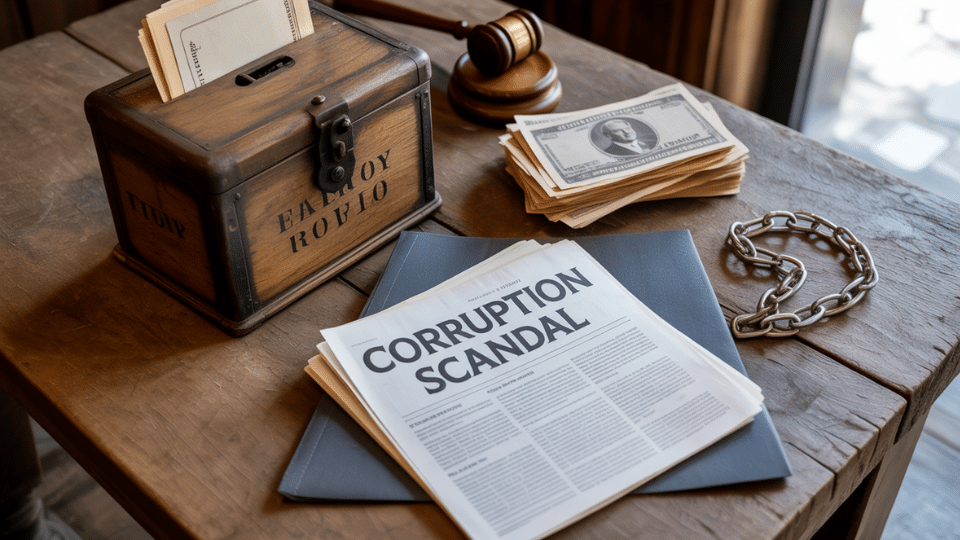Why do political scandals keep making headlines year after year?
No matter the country or system, stories of corruption, cover-ups, and misconduct surface again and again.
Some are about money, others about abuse of power, while many stem from personal failings.
The bigger question is: why do they keep happening at all?
In this blog, I’ll show you the causes of political scandals that keep happening, explain why they continue across decades, and highlight what they mean for democracy.
By looking at these patterns, we can understand not just the scandals themselves but also why they remain a permanent feature of politics.
The Main Causes of Political Scandals Keep Happening
Scandals are rarely random events.
They grow out of the pressures and temptations built into political life.
Leaders operate under constant public attention, but they also face opportunities and risks hidden from view.
When ambition, secrecy, and weak systems collide, scandals almost always follow.
1. Political Power and Ambition
At the center of many scandals is the simple fact that power can change people.
Leaders with wide influence sometimes begin to believe they are untouchable.
The drive to stay in office or expand control leads to risky decisions.
When ambition outweighs responsibility, boundaries are ignored, and scandals are the result.
When those in power abuse their position, voters see it as betrayal. This creates anger that often shows up at the ballot box.
2. Weak Oversight and Civil Loopholes
In many countries, rules exist on paper but are poorly enforced.
Watchdog agencies may be underfunded or influenced by politics, creating the loophole that causes a political scandal.
Loopholes in campaign finance, contracts, or budgeting make it easy to misuse funds.
Scandals often break only when outsiders like journalists or whistleblowers expose them.
Without strong oversight, citizens lose faith that leaders play by the same rules as everyone else.
3. Money in Politics
Money is one of the oldest drivers of scandals.
Campaigns are expensive, and politicians often depend on donors or lobbyists.
Deals made in secret blur the line between legal support and corruption.
When exposed, these hidden exchanges show how financial interests can outweigh the public good.
Voters want decisions made for citizens, not for the highest bidder. Money scandals confirm the fear that politics is for sale.
4. Lack of Transparency
Secrecy breeds suspicion. Governments that hide contracts, budgets, or negotiations create fertile ground for scandal.
Without transparency, misconduct can continue unchecked for years.
When hidden behavior is finally revealed, the damage to trust is even greater.
People expect openness. When secrets come to light, even small missteps feel like major betrayals.
5. Media and Public Scrutiny
Today, scandals spread faster than ever. With 24/7 news and social media, even minor issues can dominate headlines.
Leaks, whistleblowers, and investigations ensure that misconduct rarely stays hidden for long.
While this helps reveal the truth, it also means scandals are a constant feature of political life.
Scandals make people feel involved in holding leaders accountable, but they also create fatigue when stories never seem to stop.
6. Human Nature and Personal Failings
Beyond money and power, many scandals are deeply personal.
Greed, arrogance, and poor judgment are part of human nature, and politicians are not immune.
Affairs, personal misconduct, or reckless choices often spark scandals that shake careers.
Personal scandals remind voters that leaders are flawed people, but they also raise questions about character, judgment, and fitness to lead.
Patterns That Repeat Across Time

Looking across decades, certain themes appear again and again.
These patterns explain why scandals are not only common but also cyclical. History repeats itself because the underlying pressures never fully go away:
- Cover-ups worsen the damage. Hiding mistakes almost always makes the scandal bigger than the original act.
- Public anger builds quickly. Once voters feel lied to, trust erodes and is hard to rebuild.
- Scandals drive reform. Many ethics laws, campaign finance rules, and oversight measures were created in response to past scandals.
Why Scandals Keep Coming Back After Reforms?
Even with reforms, new scandals continue to emerge. Why? The answer lies in a mix of changing times and old habits.
This cycle ensures scandals remain part of politics.
They don’t happen because systems fail completely; they happen because systems are built and run by people, and people are flawed.
- Technology creates new risks. From data privacy breaches to social media manipulation, modern scandals look different but grow from familiar weaknesses.
- Old systems persist. Patronage, favoritism, and secret deals remain in politics despite new rules.
- Partisanship shields leaders. Supporters may excuse or downplay scandals when it benefits their side.
- Accountability is uneven. Some leaders resign quickly, while others survive because of party loyalty or weak institutions.
Conclusion
Political scandals are not going away anytime soon.
They happen because power is tempting, oversight can be weak, money influences decisions, and human flaws are constant.
The causes of political scandals keep happening are woven into political systems everywhere, which is why they remain such a steady feature of history.
Each scandal may look different, but the roots are often the same: too much power with too little accountability.
What do you think?
Are scandals a sign of failure in politics, or are they proof that democracy still works by bringing hidden truths to light?
Share your thoughts below.






































